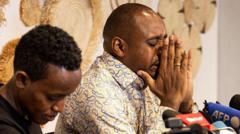Albert Ojwang, a teacher and blogger, died after being detained in Kenya for a "false publication" on social media. His death raises serious concerns about police conduct and government repression, drawing calls for an independent investigation.
Kenyans Call for Justice After Blogger Dies in Police Custody

Kenyans Call for Justice After Blogger Dies in Police Custody
The arrest and subsequent death of Albert Ojwang sparks outrage and demands for a thorough investigation amidst rising concerns about government treatment of critics.
Kenya's independent police oversight body is initiating an investigation into the death of Albert Ojwang, a man detained on charges of "false publication." Ojwang was arrested due to a post on social media platform X, reportedly insulting a public figure. Following his arrest in Homa Bay, he was transported 350 kilometers (approximately 220 miles) to custody in Nairobi, where he allegedly sustained head injuries from a cell wall, leading to his death shortly after arrival at the hospital.
His father, Meshack Opiyo, informed the media of the disturbing events surrounding his son's arrest. Senior police officer Stephen Okal suggested that the injuries could be attributed to an "attempted suicide," a claim that adds to the controversy surrounding the circumstances of Ojwang's detention.
Amnesty International's Kenya branch described the incident as "very suspicious," emphasizing the need for an urgent, thorough, and independent investigation. The organization criticized the police's handling of Ojwang's case, particularly the decision not to process him at a local police station but rather transfer him to a distant location. Irungu Houghton, director of Amnesty International Kenya, called for the preservation of evidence at the Nairobi station, underscoring the gravity of this incident.
The police maintained that Ojwang was "lawfully arrested," yet his case raises significant concerns regarding the treatment of government critics in Kenya. The context surrounding Ojwang's death is particularly unsettling given a recent incident where software developer Rose Njeri faced charges under a cybercrime law for developing a tool intended to assist citizens in opposing a government finance bill.
This incident highlights growing apprehension among civil rights groups and citizens regarding freedom of expression and the treatment of dissenting voices in Kenya. As public scrutiny intensifies, the call for accountability in Ojwang's death is echoed across various sectors, reflecting broader concerns regarding governmental restrictions on individual rights.


















